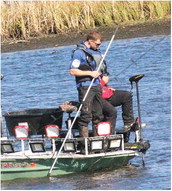Attorneys prep for trial in ‘06 homicide


By Kevin O’Brien
In the months since Cindy Schulz-Juedes pled not guilty to murdering her husband, her attorney has been working to get his client released from jail while prosecutors have asked the court to limit what evidence can be used as a defense in a trial likely to take place in 2021. Schulz-Juedes, 65, remains incarcerated at the Marathon County Jail after entering a not guilty plea to a first-degree homicide charge on Feb. 3 in the 2006 shooting death of her husband, Ken Juedes, who lived in rural Unity. At that Feb. 3 hearing, Judge Mike Moran denied a request from defense attorney Earl Gray to lower his client’s bond amount from $1 million to $100,000.
Schulz-Juedes has been in jail since she was arrested at the end of November. Gray says she is in poor health and would not be a threat to the public if released, but Judge Moran has said the seriousness of the charge against her does not warrant a reduction in the bond.
The next hearing in the case is scheduled for Nov. 23, when Judge Moran will consider motions recently filed by district attorney Theresa Wetszteon and assistant attorney general Robert Kaiser, who stepped in for special prosecutor Richard Dufour earlier this year.
At an Aug. 25 hearing, Judge Moran denied a motion to release Schulz-Juedes and granted a continuance, allowing more time for a jury trial to be scheduled.
The rulings were a response to a motion filed Aug. 17 by Gray, who sought to have his client released from jail after a 90-day period had elapsed since he filed a demand for a speedy trial back on May 9.
According to state statute, the trial of a defendant charged with a felony must commence within 90 days after a trial date is demanded by either party. If that does not happen, the law says the defendant should be released from jail with bail conditions.
Gray noted in his motion that the Wisconsin Supreme Court temporarily suspended jurytrialsaftertheCOVID-19outbreak in March, and that suspension has been extended until a court safety plan has been approved by each circuit court. The Marathon County Circuit Court has not yet approved a plan for holding jury trials, but Gray says that should not prevent the court from at least scheduling a trial in his client’s case.
“Any assertion that the court cannot schedule a jury trial date is unfounded,” Gray wrote.
Gray said the delay has prevented Schulz-Juedes from “issuing subpoenas to out-of-state witnesses who are likely to contest the subpoenas in their home states.” Scheduling the appearance of those witnesses will take advanced planning, he said.
“Putting it all together, Ms. Schulz-Juedes’s state and federal constitutional right to call witnesses, and right to a speedy trial, should not be hampered any further, especially when all she is asking for is asking for is to schedule a date for her jury trial,” Gray wrote. In response, the prosecutors pointed to the high level of COVID-19 activity in Marathon County, and said this could get in the way of conducting a fair trial. “Jurors must be given reasonable assurance of their safety before participating in the jury process,” the prosecutors wrote. “They must be comfortable during the trial and be able to focus on the evidence and not the risk of a COVID-19 infection.”
Gray responded by pointing to high rate of recovery among COVID patients in Marathon County and the decreasing number of cases at that time in August. He called into questions the prosecutors’ claims that fear of coronavirus would place undue “street and anxiety” on jurors, calling it “ entirely meritless.”
“Simply put, COVID-19 would not prevent someone from doing their civic duty when called upon,” he said.
Ultimately, though, Judge Moran denied Gray’s motion, which meant that Schulz-Juedes will remain in jail and a jury trial will be scheduled at a later date.
Prosecutors’ motions
Prosecutors submitted a pair of motions on Sept. 4, seeking to bar evidence implicating a third party in the murder and to preempt any arguments regarding the defendant’s mental state at the time of the crime In the first motion, the prosecutors said Gray’s reference to calling out-ofstate witnesses who may contest their extradition implies that the defense “will be accusing those witnesses of having committed the offense with which the defendant is charged.”
The prosecutors point out that Wisconsin courts have established a “bright line standard” for introducing thirdparty suspects that requires the defense to show evidence of motive, opportunity and “direct connection” to the crime.
In a Sept. 16 letter to the court, Gray noted that he has not filed a notice of a third-party perpetrator, and he won’t make that decision until a trial date is set and he contacts witnesses.
“Then, if I believe I have sufficient evidence to present a third party perpetrator notice, I will file one,” he wrote. “Until that time, I unable to ethically or competently respond to the state’s motion.”
The prosecution’s second motion seeks to prevent the defense from introducing evidence regarding Schulz-Juedes’ “mental state.”
Included in the motion is evidence that she may have lied about a doctor finding “spots” on her brain shortly before the murder. According to a medical report attached to the motion, a CAT scan performed at Memorial Medical Center on Aug. 25, 2006, shows “no intracranial abnormalities” The prosecutors point out that the burden in on the defense attorney if he wants to introduce other evidence of psychological or neurological issues — in a way that is not designed not to garner sympathy with the jury.
In another development, Detective Dennis Blaser of the Marathon County Sheriff’s Department obtained a search warrant in June to review digital surveillance footage from in and around the Juedes property in the weeks leading up to the Aug. 30 homicide.
The video could contain evidence of criminal activity and “assist in determining the relationship between the victim and his wife in the days leading up to the victim’s death,” Blaser wrote.
Gray also noted in one of his filings that the prosecution has sent handwriting samples to the FBI for analysis, and he would like time to find his own handwriting expert if that is the case.
“The state has had 14 years to prepare its case and is still looking for witnesses while my client languishes in jail,” he said.

Ken Juedes


